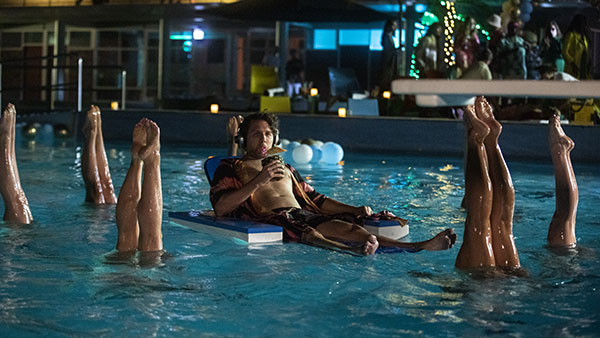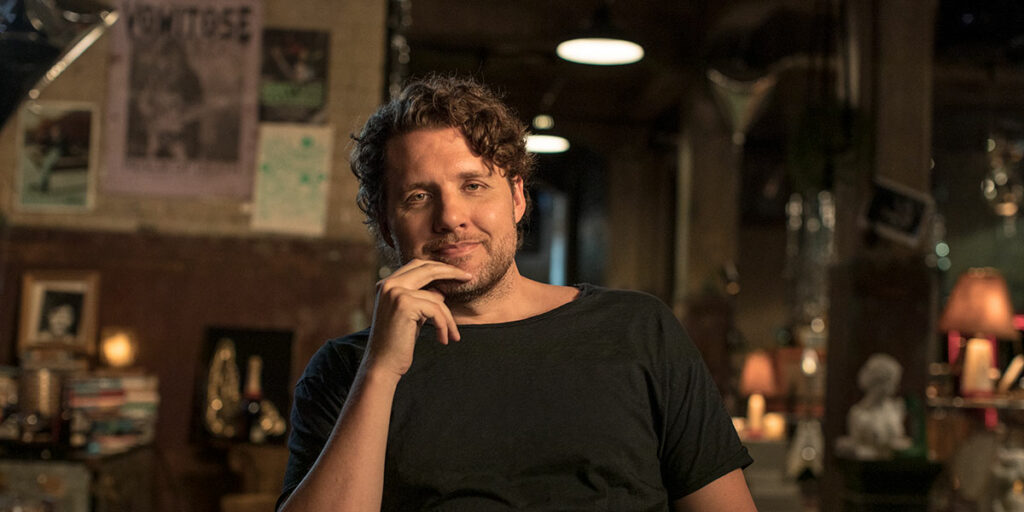The Subtle Art of Not Giving a #@%! isn’t remarkably made as a documentary, but its message about what really matters in life is far too invaluable to pass up.
The Subtle Art of Not Giving a #@%! is a documentary with such an eye-grabbing title that I defy anyone to hear it and not be at least curious. That’s clearly part of what helped sell the original book the film is adapting, but is there more to hook viewers beyond that? Mark Manson, the author of the book, is put front-and-center in this adaptation as he narrates chunks of his life alongside various analogies, anecdotes, and life lessons. In doing so, his goal is to give people a different kind of self-help than what most conventional wisdom may offer, through tougher truths, counterintuitive philosophies, a dissection of why society behaves the way it does, and how to cut through all the irrelevant details of life to reach what really matters.
I haven’t read the book The Subtle Art of Not Giving a #@%!, but I imagine that most of the material, advice, and stories told by Manson in this documentary are ripped directly from his source material, which then begs the question: what does this adaptation do to take advantage of this change in medium? Can I imagine reading the book and getting a different experience as compared to seeing the movie? For the most part… no. That’s not to say The Subtle Art of Not Giving a #@%! doesn’t try to use the film medium well. In addition to Manson being very engaging to watch and listen to as he leads us through the film, loads of stock footage, reenactments of his life, and drawn/animated bits are present to enhance the meaning or emotion behind what he’s saying. Some of them really work to cement a point being made, like a little animated clip of someone running on a treadmill decaying into a skeleton while chasing a carrot on a string, which illustrates the notion of wasting one’s life chasing something they’ll never get. Other visual cues, though, either don’t really seem too relevant or aren’t creatively used at all.
The structure of The Subtle Art of Not Giving a #@%! is largely the same way. Some points and anecdotes are carefully spread throughout the documentary in a natural way that lets you see them differently each time. But a lot of them feel scattershot, as if they were just thrown in somewhere because there wasn’t enough time to come up with a better way to work them in. There’s almost no flow, no rhyme or reason, to how this film progresses and evolves its central ideas. Sometimes it circles around the same ideas to the point of redundancy, sometimes it goes off tangents that are either too long or too irrelevant, and sometimes the titled “sections” have so much crossover that I wonder what the point of splitting the film up into sections even was. As someone who doesn’t know the ins and outs of the book, I’m just speculating here, but my impression is that this documentary adds just enough visual flair to make it a decent alternative or companion piece to its source material. But I can easily imagine the book having more extensive thoughts that would make it the better option if you just wanted to watch one or the other.

But whichever you choose, what’s just as important as how a film says something is what it’s even saying at all. And this is where The Subtle Art of Not Giving a #@%! becomes a very valuable and, for some, necessary watch. Mark Manson’s words are blunt, uncompromising, and occasionally harsh, and they cut directly to the core of how human psychology and societal expectations feed into one another in the worst ways. His tagline pieces of advice include “You’re Not Special” and “The Danger of Happiness,” which is in stark contrast to what most of us have been led to believe throughout our lives. He then proceeds to talk about why we constantly use up our lives and energy in a search for happiness through meaningless vanity, and why markets and media prey on that to keep people wanting more even once they find what they think they’re looking for. He goes beyond the typical “money can’t buy happiness” cliché and claims that nothing can buy happiness. No magical event or formula is going to stop negativity and sadness from entering your life.
You think more time off work will make you feel freer? You’ll often be dissatisfied with how you spend that time. You think you’ll feel accomplished winning some competition? You’ll just want to validate your win by continued victories. You think you’ll feel seen if an online article you write ends up trending? You’ll still be worrying about how to keep that up and not fade away again. That all may sound depressing, but Manson never makes even his most challenging, toughest lessons feel hurtful or discouraging. His tone and delivery are never belittling, pretentious, or mean-spirited, but rather approachable, good-natured, and often humorous. He makes it very clear that he’s been guilty of everything he’s warning you about. He never loses sight of that.
Manson explains throughout The Subtle Art of Not Giving a #@%! why it’s not only okay to not always be happy or perfect, but why it’s usually good. He breaks down the illusion that any one person has found that magic formula or is so much more exceptional than everyone else. Social media clearly plays a huge part in that illusion by often showing picturesque triumphs that make us feel lesser for not measuring up to that. “That’s not reality!” he professes, and he’s right! We always pay attention to the people who make it big, but that makes them out to be a much larger percentage of the world than they are. And even they don’t feel satisfied. As someone who really wants to make a professional living out of covering entertainment like this, I’ve always been reminding myself of that, but it still feels good to hear the sentiment laid out so unapologetically by someone else.
The other biggest talking point of The Subtle Art of Not Giving a #@%! is our perception of ourselves when it comes to not just what we want to have, but what we feel we should have. This again ties back into the notion of us being special and how, if that doesn’t make us feel like worse people, it makes us feel entitled, maybe because we feel like worse people. We’re all guilty of trying to lash out or blame outside forces when something goes wrong in our lives, or losing sight of how insignificant those problems are in the grand scheme of things. But Manson again doesn’t stop at the surface-level statements like “The world doesn’t revolve around you.” Instead, my favorite thing he says in the entire documentary is that even when you’re not at fault for your pain, you’re still responsible for it. What you do with it and how it affects your decisions are still in your control. He pushes that philosophy to some of the most uncomfortable examples imaginable, but they all make sense and should get viewers thinking about how they’ve handled suffering in their pasts.
A lot of the commentary in The Subtle Art of Not Giving a #@%! is very close to the kinds of thoughts I’ve been having, especially in the past few years. I’ve had to resist the impulses of my mind to seek self-fulfillment in how many people care about what I have to say. I’ve reacted to terrible things like the COVID-19 pandemic in negative, entitled ways that lose sight of how fortunate I still was through them. And as it’s lately really hit me that I and everyone I know will all be gone forever one day, I’ve found myself at a crossroad between feeling guilty about not making the most of that limited time and wondering if my idea of “making the most” has any relevance to what really makes life worth living. The Subtle Art of Not Giving a #@%! is a reminder or reinforcement to many that so much of the noise and molded perceptions of life really don’t matter in the long run. It definitely makes me want to finally get the book for an even more detailed and fleshed out version of what’s examined here.
The title at a glance makes this documentary out to be some lesson in how nothing should matter to you, which isn’t the case. It’s really about how to wipe away the substantial amount of trivial nonsense that doesn’t matter in order to keep the focus on what does. The Subtle Art of Not Giving a #@%! is just a more eye-catching name… which, as someone who’s altered titles for the sake of them being more searchable, I can relate to. For me, it was really affirming to hear someone lay out a large amount of their outlook that I’ve been trying to cope with even before watching the movie. And while I don’t think anyone is going to have their own outlooks completely overhauled by what’s said and shown here, many people will be given a new perspective that could absolutely point them in a better direction. The Subtle Art of Not Giving a #@%! may be a little uncinematic and unfocused when it comes to how it gets its message across, but it gets things right where they matter most… which, come to think of it, may be the most fitting outcome given what that message is.
The Subtle Art Of Not Giving A #@%! is now available to watch on digital and on demand.

